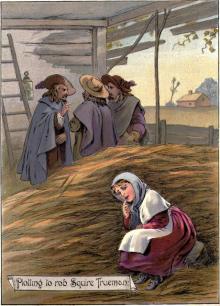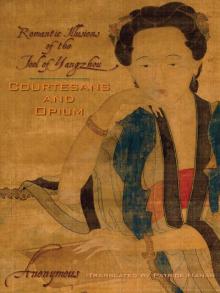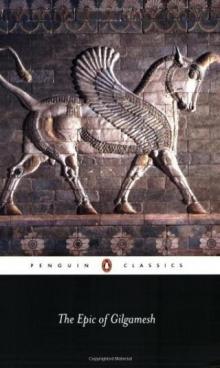Sight Unseen Read online
Page 7
She’d reached the Great Way.
Strictly speaking, the Great Way was a road. Not even a very long road—only a hundred miles, connecting the capital to the Royal Academy. In the past, when a prince or princess of the realm had reached the age of ten, the child would be sent from the Palace to the Royal Academy. They’d make the journey alone and on foot, paying homage to their ancestors as they walked from shrine to shine, each a marvel of architecture and artistry.
When the gates of the Royal Academy were closed, it was a cloistered retreat. A place where renowned scholars from every discipline could study, write, and confer with their peers. When the young prince or princess arrived, at the end of their pilgrimage, they threw open the gates and the scholarly haven transformed into a school. All the great scholars were required to teach.
For two years after the prince or princess arrived, any child of a like age who reached the Royal Academy could, by passing a mysterious test, attend the school. And so the royal heirs acquired, along with an education, friends and allies who could staff the high offices of the land.
But neither the Royal Academy, nor all the rituals associated with it, could have made the Great Way so important. The road itself loomed larger than the capital or the Academy in popular imagination because of the shrines.
Shrine was too simple a word to describe these complexes. At heart, they were royal tombs—though the graves were always small, simple, and out of the way. Visiting the dead could enhance the power of their remains.
The bulk of the shrine, its primary purpose, was a charitable foundation dedicated to good works. Each included a hostel where any traveler could stop for up to three days of free room and board. These hostels were as elaborate as any palace, as fancifully designed and lavishly executed.
As a result, almost every citizen of Tenem walked the Great Way at some point. And, when a royal heir opened the Academy to students, any child—any child—who thought they deserved a place at the prince or princess’s side could reach the Academy and take the exam.
Ozias’s parents, Queen Lieve and King Zal, had been traveling the Great Way on a visit to their son when they were set upon by mercenaries and killed. Ozias had immediately left the Academy, closing the gates behind him. In the following years, he’d channeled his grief into two tasks: finding out who had ordered the assassination, and building his parents’ shrine, which rose on the very spot where they had died.
After he’d married and had a child of his own, instead of sending the prince to re-open the gates, Ozias had brought private tutors to the palace and expelled the few scholars who remained at the Academy.
Alma peered up at the sun, directly overhead, and then up and down the Great Way. The crystalline spires of Helia’s shrine glittered in one direction, the golden domes of Toril’s shone in the other. Even Alma, who’d had no formal education, could list all the shrines in order. Helia’s shrine lay north of Toril’s, Lieve and Zal’s shrine lay south of both, so she knew which way to go.
Just as she had with Driss, Alma traveled parallel to the highway, occasionally veering close enough to keep it in view. No fixed distance separated the shrines, but there was always at least one within a day’s walk of the last.
The bounty of the heartlands meant that Alma never had to dip into her all-in-one’s dwindling food stores. Bushes yielded tart berries, trees groaned with sweet fruit, mushrooms grew in sheltered nooks. But though the landscape was idyllic, the shrines exquisite, the sun mellow, every step Alma took along the route made her heart ache. It gave her a glimpse of what Tenem had been like before Ozias. Suspicion and fear reigned everywhere else. Here, some of the old spirit survived. Like—Alma shied away from the thought—a ghost.
At night, while the travelers bedded down in the shrines, Alma filled her canteen from one of the wells seeded along the highway. Then she retreated a safe distance to a pleasant meadow where she could unroll her bedroll and sleep under the stars.
She passed Toril’s shrine and then Nicory’s. She was making good time; the shrine to Lieve and Zal would be next along the route. The sky clouded over in the afternoon. The clouds thickened, turned gray, and loosed a brief but heavy rain. An hour later, the storm had passed and left a glow on the landscape—the grass was greener, the flowers brighter, stray droplets of water sparkling in the sunlight and making the world look like it had acquired a coat of diamond dust.
Thoroughly soaked, Alma trundled on in wet, stiff garments that warmed before they dried. When it came time for Alma to lay out her bedroll, she couldn’t find any dry ground. The rich soil was soft and damp; her feet sank into it with every step. She hunted for a sheltered spot for hours, until the need for sleep overcame her need for comfort. She lay down in her still-damp clothes, hardly slept at all, and began the next day in a colossally foul mood.
Lieve and Zal’s shrine blended into its surroundings with astonishing grace. Green marble trimmed with malachite inlay sheathed the low walls. A bright spring green tinted the leaded glass windows and even the doors were made of copper aged until it had acquired a mottled patina the color of seafoam.
The whole complex was a love letter to the beauty of the land. Had Ozias, the heartless monster who’d terrorized Tenem since the day he’d taken the throne, really husbanded this fanciful structure to life? Though the shrine itself was fairly small—it wouldn’t hold many travelers—and that was more like the Ozias she knew: as lavish as any of his predecessors, but lacking their generosity.
A beautifully tended open-air garden surrounded the enclosed kitchen. Flowers bloomed in well-tended beds and ferns and bushes screened the tables and chairs where travelers ate their breakfast, forming secluded nooks for the traders catching up with old friends, families with small children.
A detour into the surrounding hills led her to a sheltered copse of trees where she felt safe leaving her all-in-one. Then, unencumbered, she began searching the vast grounds for the royal graves. She strolled through orchards, vegetable patches, fields of wheat. Everything a picky cook would need to stock the kitchen larder. The shrine appeared to be self-sustaining.
She paused to admire an elegantly constructed fishery, a chain of small ponds stocked with silvery fish and interspersed with arbors and benches. A young man stood on the bank and stared idly into the water. He was tall, fit, and graceful, the perfect model of Tenemi youth.
Or maybe she was overthinking it. With his fine clothes, jewels glinting from rings on his fingers and toes, and a thick gold necklace looped around his neck, he was every bit the Little Lordling. He even looked like a younger version of Driss.
Judging by the two brawny guards chatting a short distance away, he hailed from a family of some importance. Clearly someone she should avoid. Alma began tiptoeing toward a vine-decked arbor, to hide herself and beat a quick retreat.
A servant trotted into view, scooted past the two guards, and knelt, touching his forehead to the ground. A cold finger of dread slid down Alma’s spine. The full obeisance was reserved for the royal family.
That young man wasn’t just a Little Lordling. He was Ozias’s eldest son and heir, Prince Cyrus.
Word and wish. Alma forgot about being subtle and fled. But her heart never stopped racing. If Cyrus was here, then Ozias must be as well.
She continued her search for the graves. She wasn’t really looking forward to finding them. Making plans, it turned out, was a lot easier than following through on them. She eventually spotted a small domed outbuilding clad in the black and gold tiles unique to cleansing chambers, built to house rituals to protect the living from the dead.
She approached carefully, but saw no signs of life. A low fence, hardly two feet high, enclosed the graves. Two small malachite plaques, flush with the ground and low enough to disappear into the carpet of neatly trimmed grass, marked where the bodies were buried. The gravesite nestled into the surrounding hills, open country untouched by roads. The area lay fairly distant from the main shrine complex, at least fifteen minutes
on foot.
The domed cleansing chamber had two arched doorways, placed exactly opposite one another. Gold tiles framed one, black tiles the other. Alma entered through the gold door. Inside, the room was divided into two halves, black to the right and gold to the left. A raised pool filled most of the small space; it didn’t leave room for much else. A row of indigo robes hung from pegs on the right and a wicker hamper stood on the left.
Alma turned right. She removed all her clothes, just like a true caretaker would. Caretakers didn’t bring their own clothes into a graveyard for fear that foul magic would cling to the cloth. It sounded like superstition to Alma, but better to err on the side of caution.
She plucked one of the indigo robes from its peg and dragged it over her head, fitting her arms into the wide belled sleeves. The caretakers believed that if they hid their bodies from view, the dead wouldn’t recognize them after they’d changed into their own clothes and couldn’t follow them home. More nonsense. Magic lived on the tongue, in the throat. It expressed itself through speech. It didn’t have eyes and it wouldn’t be fooled by a silly outfit.
Still, the purpose of the robes was to render the wearer anonymous. With their shapeless fit, long skirts, and capacious hoods, they couldn’t have suited her purposes any better. Thus prepared, she folded her clothes into a bundle, left them atop the hamper, and exited through the black door.
Chapter 7
Alma busied herself about the gravesite, weeding the well-tended grass. Ozias didn’t come. She ran out of weeds and, to keep up the charade, fetched a chamois cloth from inside the cleansing chamber and set about buffing the plaques. This made her working arm tingle uncomfortably, a sure sign the skeletons below were active.
Unnerved, Alma switched to scrubbing flecks of dirt from the fence. Soon the wrought iron gleamed, and Ozias still hadn’t arrived. She began to worry that he’d sent his son on pilgrimage alone while he’d remained in the capital, devising some fresh horror to visit upon his subjects.
Alma ventured closer to the shrine. She wanted proof of the monarch’s presence. She found it in the form of a royal pavilion bearing the king’s arms. It consisted of a ring of silk tents, with colorful privacy screens filling the gaps. Guards patrolled the tiny area, loaded muskets slung over one shoulder, swords at their hips.
Traditionally, Tenemi rulers slept inside the shrines, among their people. Ozias, paranoid and unfriendly, obviously preferred not to. The coward.
Alma retreated to the burial grounds. All quiet. She ducked into the cleansing chamber and came face to face with a skinny, gap-toothed man with his pants around his knees.
“Shit,” Alma hissed, tackling the man.
She wrestled him to the ground. He cried out. She clapped a hand over his mouth and tensed, ears pricked. No answering noises. The graves were too isolated, the afternoon too far gone. Alma breathed a sigh of relief.
The man took advantage of her distraction and tried to throw her off. She grappled him back down. They must have looked ridiculous, a weedy caretaker wrestling a prison-starved woman. Not that it was much of a fight. Alma’s years on the street gave her a distinct advantage and, before long, she’d used the man’s own belt to tie his hands behind his back. His pants, with a bit of work, cuffed his ankles. And she ripped one of the sleeves from an indigo robe to make a gag.
She sat back on her heels and pushed back her hood, panting from all the exertion. Disaster averted with no help from Driss or Ben. She was a little proud of herself.
“Hadn’t planned this part, but . . .” With a grunt of effort, she heaved the man over her shoulders and carried him to the copse where she’d hidden her all-in-one.
Then she peeled off his gag.
“I know you,” the man wheezed.
Alma sighed. “Of course you do.”
He began to hyperventilate.
“Are you all right?” Alma asked, flummoxed.
The man flushed red.
“Do you need some water?” she asked.
“You shouldn’t be here,” he gasped.
“I’ll get you some water.”
Alma fetched her canteen and lowered the gag so she could tip it to the man’s lips. He drank eagerly, only to spit it all back at her.
“What the—” Alma recoiled. “These are your robes! You just spat on your own robes!”
“Witch!”
“You think I’m going to wash them before I put them back? Some friend of yours will be walking around all day wearing your spit!”
The man, apparently dissatisfied by her reaction to his insult, tried again. “I’ll die before I let you twist my mind!”
“Whatever.” Alma sighed. She’d hoped he might answer a few questions, but obviously that wouldn’t be happening. “Take a nap or something.”
She left him in the copse of trees and returned to the graves. By the time she arrived, the sun had set and the area was once again completely deserted. No sense in hanging around; she’d have to try again the next morning.
Alma checked on the angry caretaker. He began spewing curses the moment she loosened his gag, all ‘witch’ this and ‘drawn and quartered’ that. For a man dedicated to good works, he really did have a bad attitude.
“You talk to the dead with that mouth?” she snapped.
The man quieted immediately.
She bound him up again, more carefully this time. Nothing too tight or too loose and, after her time at the Safe House, she had very strong opinions on the subject. Then she curled up against her all-in-one in what she expected would be a vain attempt to sleep.
She must have dozed off, though, because she woke from a strange dream about giant angry bees to find the caretaker rubbing his cloth bindings against the rough bark of the nearest tree.
“I get it, I really do.” Alma crawled over to check the belt and retie the knots. “But you’re an awful lot of work.”
“Traitor,” hissed the caretaker.
“And proud of it,” Alma replied, finishing up.
She trudged back to the shrine and switched her robes for a new set, since the originals had acquired a set of deep wrinkles in addition to the spots of dried spittle.
She returned to her fake gardening. She was stooped over, nose in the dirt, when Ozias and Cyrus arrived. Alma nervously began pulling up handfuls of perfectly healthy grass as they approached, walking side by side.
“I’ve come every day for the past three days,” complained Cyrus. “That’s enough. I never even met them.”
Ozias paused. He was a tall man, fit and firm despite his age, his thick black hair touched with gray at the temples and a neat, salt-and-pepper beard. He cut an elegant figure, dressed in layers of richly dyed silk, gold threads glinting on his sandals.
He was a man of impeccable taste, a dutiful son, an engaged father. And none of that made him any less a monster.
“Very well,” said the king. “You are excused.”
“Thank you, father!” Cyrus began skipping away. “Give my love to Grandmama and Grandpapa!”
Ozias shook his head sadly and continued on toward the graves.
Alma stood, fist still clenched around a handful of grass cuttings. It’s time, she told herself. She’d grab him. Make him answer her questions. She had to act fast, before he recognized her.
Her feet began to tingle the same way her hands had when she’d polished the plaques.
“Stay, Sister, and be at ease,” said Ozias, kneeling—kneeling! Ozias!—on the grass within the fenced enclosure. “There’s nothing to fear here.”
Grab him! she commanded herself, unmoving. Now!
Ozias caressed the grass. How many of his own citizens did he sentence to death every day, and yet he had love to spare for a nice bit of lawn?
“My boy doesn’t understand,” said Ozias.
“Understand what?” Alma’s lips tingled as she spoke.
“What it’s like to lose the people you love best in the world,” said Ozias. “What it’s like to have them ripped
from you, taken too young.”
“He doesn’t . . .” The hypocrisy of it made her sick. And . . . dizzy. Alma sucked in a careful breath. Something strange was happening.
“Sometimes I wonder if I’ve been too soft with him,” Ozias murmured. “I know he finds me harsh, at times.”
Harsh? Ozias the tyrant, Ozias the blight upon the world, Ozias the bloody—harsh?
“But I would do anything to protect him. Do you hear me?” Ozias beat his fist on the ground, and Alma felt the reverberation on the soles of her feet, vibrating up her shins, out of all proportion with the force of the blow. “Anything.”
Word and wish. He was speaking to his parents and they were listening.
“But who will protect him after I’m gone?” Ozias continued. “There are those eager enough to teach him the same lesson I had to learn when you died. Traitors who plot against me. I rid the world of one and two more spring up in his wake.”
“Killing you . . .” Speaking made her throat itch. She swallowed, for all the good it did. Now that Lieve and Zal had their son’s attention, they wouldn’t let go without a fight.
“They don’t know what it’s like,” Ozias said. “These rebels, these murderers.”
“They know.” Alma thought of Gadi, of Driss’s parents, of smoke curling up from a village set aflame. “They know.”
The earth rumbled.
Ozias slapped the grass again. “If they understood, they wouldn’t have killed you!”
“Do you really believe that?” Alma’s voice was not her own. It was deeper, halfway between a man’s and a woman’s, and it made her tongue hurt.
“Yes.” Ozias looked up at her, his expression tense but . . . respectful. The unearthly tenor of her voice hadn’t startled him. Quite the contrary. He’d expected it. “I do.”
The dead King and Queen were inside her. They wanted to speak through her, to use her as a vessel. But they’d have to fight for purchase. Alma’s hands, hidden in the wide belled sleeves of her robe, curled into fists. She had stronger defenses than the average person.

 Goody Two-Shoes
Goody Two-Shoes The Pearl Box
The Pearl Box And when you gone...
And when you gone... Stranger At The Other Corner
Stranger At The Other Corner My Young Days
My Young Days Harry's Ladder to Learning
Harry's Ladder to Learning Vice in its Proper Shape
Vice in its Proper Shape_preview.jpg) Promise (the curse)
Promise (the curse) The First Sexton Blake
The First Sexton Blake Golden Moments
Golden Moments Hildebrand; or, The Days of Queen Elizabeth, An Historic Romance, Vol. 2 of 3
Hildebrand; or, The Days of Queen Elizabeth, An Historic Romance, Vol. 2 of 3 The Ice Queen
The Ice Queen Phebe, the Blackberry Girl
Phebe, the Blackberry Girl Stoned Immaculate
Stoned Immaculate Hildebrand; or, The Days of Queen Elizabeth, An Historic Romance, Vol. 3 of 3
Hildebrand; or, The Days of Queen Elizabeth, An Historic Romance, Vol. 3 of 3 The Wonder of War on Land
The Wonder of War on Land Breaking Bailey
Breaking Bailey The Little Girl Who Was Taught by Experience
The Little Girl Who Was Taught by Experience The Popular Story of Blue Beard
The Popular Story of Blue Beard The Life Savers: A story of the United States life-saving service
The Life Savers: A story of the United States life-saving service Eunuchs and Nymphomaniacs
Eunuchs and Nymphomaniacs Hildebrand; or, The Days of Queen Elizabeth, An Historic Romance, Vol. 1 of 3
Hildebrand; or, The Days of Queen Elizabeth, An Historic Romance, Vol. 1 of 3 Kitty's Picnic, and Other Stories
Kitty's Picnic, and Other Stories Two Yellow-Birds
Two Yellow-Birds Courtesans and Opium
Courtesans and Opium The Emigrant's Lost Son; or, Life Alone in the Forest
The Emigrant's Lost Son; or, Life Alone in the Forest Toots and His Friends
Toots and His Friends Fast Nine; or, A Challenge from Fairfield
Fast Nine; or, A Challenge from Fairfield Ned Wilding's Disappearance; or, The Darewell Chums in the City
Ned Wilding's Disappearance; or, The Darewell Chums in the City A Picture-book of Merry Tales
A Picture-book of Merry Tales The Trail of The Badger: A Story of the Colorado Border Thirty Years Ago
The Trail of The Badger: A Story of the Colorado Border Thirty Years Ago Peter Parley's Visit to London, During the Coronation of Queen Victoria
Peter Parley's Visit to London, During the Coronation of Queen Victoria The Rainbow, After the Thunder-Storm
The Rainbow, After the Thunder-Storm Arthur Hamilton, and His Dog
Arthur Hamilton, and His Dog The Story of the White-Rock Cove
The Story of the White-Rock Cove Grushenka. Three Times a Woman
Grushenka. Three Times a Woman Adventures of a Squirrel, Supposed to be Related by Himself
Adventures of a Squirrel, Supposed to be Related by Himself Falling in Love...Again
Falling in Love...Again The Colossal Camera Calamity
The Colossal Camera Calamity Child of the Regiment
Child of the Regiment Elimination Night
Elimination Night The Kingfisher Secret
The Kingfisher Secret Left to Ourselves; or, John Headley's Promise.
Left to Ourselves; or, John Headley's Promise. The Island of Gold: A Sailor's Yarn
The Island of Gold: A Sailor's Yarn Adventures of Bobby Orde
Adventures of Bobby Orde Twain, Mark: Selected Obituaries
Twain, Mark: Selected Obituaries When Love Goes Bad
When Love Goes Bad The Incest Diary
The Incest Diary Calling Maggie May
Calling Maggie May The Infidelity Diaries
The Infidelity Diaries Diary of an Oxygen Thief (The Oxygen Thief Diaries)
Diary of an Oxygen Thief (The Oxygen Thief Diaries) ARABELLA
ARABELLA The Eye of the Moon
The Eye of the Moon Dara
Dara THE ALTAR OF VENUS: The Making of a Victorian Rake
THE ALTAR OF VENUS: The Making of a Victorian Rake The Book of Death
The Book of Death The Book of David
The Book of David The Devil's Graveyard
The Devil's Graveyard The Book With No Name
The Book With No Name I Am A Lesbian
I Am A Lesbian Njal's Saga
Njal's Saga The Epic of Gilgamesh
The Epic of Gilgamesh Darling
Darling Tal, a conversation with an alien
Tal, a conversation with an alien Go Ask Alice
Go Ask Alice Aphrodizzia
Aphrodizzia The Campus Trilogy
The Campus Trilogy Augustus and Lady Maude
Augustus and Lady Maude Lucy in the Sky
Lucy in the Sky Sight Unseen
Sight Unseen Pleasures and Follies
Pleasures and Follies The Red Mohawk
The Red Mohawk A Fucked Up Life in Books
A Fucked Up Life in Books Chameleon On a Kaleidoscope (The Oxygen Thief Diaries)
Chameleon On a Kaleidoscope (The Oxygen Thief Diaries) Astrid Cane
Astrid Cane BEATRICE
BEATRICE The Song of the Cid
The Song of the Cid